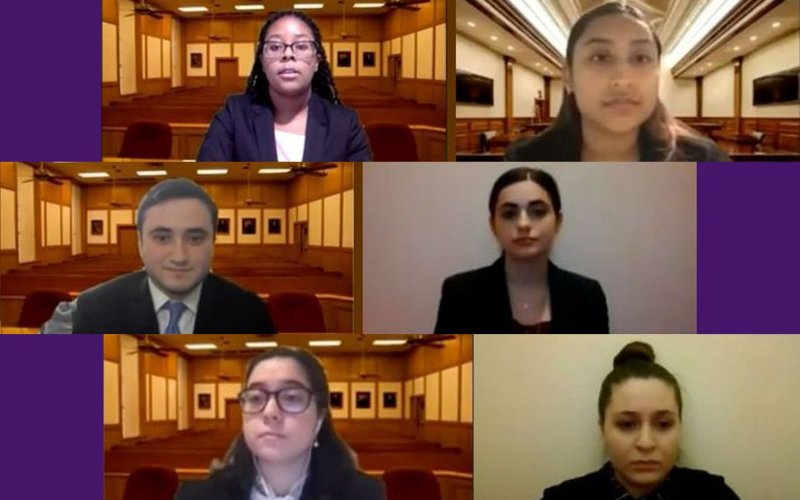UAlbany Mock Trial Hosts Virtual Invitational

ALBANY, N.Y. (Feb. 23, 2021) — UAlbany Mock Trial hosted its 2nd annual Capital Region Clash Mock Trial Invitational last month, switching to a virtual platform this year because of the COVID-19 pandemic.
And because the competition was on Zoom, more teams were able to participate. UAlbany senior and Mock Trial's tournament director Damien Whikehart invited 21 teams from across the state and from Connecticut, Massachusetts, Pennsylvania, Alabama, Arizona, Colorado, Michigan, Missouri, Minnesota and Texas.
UAlbany Mock Trial has two teams, and the B Team came in third in the competition, just behind Penn State and Saint Louis University. UAlbany sophomore Diana Slobodian received an outstanding attorney award with a near perfect score as one of the highest-ranking attorneys at the tournament.
“I am so lucky to work with such a motivated group of students across all majors and years,” said Slobodian. “Everyone is able to come together in their passion for the justice system.”
The tournament began with an Opening Ceremony and two keynote speakers from co-sponsors University at Albany and Albany Law School.
“The events of last year have shone a harsh light on inequities and failures within our justice system,” JoAnne Malatesta, UAlbany’s vice provost and dean for undergraduate education, said in her address. “By developing skills in trial advocacy, students gain a deeper understanding of the complexity of law, while also building strength and character through their extensive work and training for these trials.”
Rosemary Queenan, Albany Law’s associate dean for student affairs, also talked about the valuable skills students learn through mock trial competitions. “It is exciting to see so many students from around the country who are interested in the law,” she said.
All the teams are registered with the American Mock Trial Association (AMTA), which sponsors regional and national-level competitions, providing alternating criminal and civil cases that take place in the fictional state of Midlands. This year it was a civil battery/negligence per se case, involving the production and serving of wine contaminated with pesticides.
In the competition, teams of 10 pose as lawyers and witnesses for prosecution/plaintiff and defense, and engage in trials over four rounds per competition, delivering opening statements, conducting direct and cross examinations of witnesses, and concluding with closing arguments.
These intercollegiate trial simulations give students hands-on experiential learning opportunities in preparation for careers in law and beyond. “Our mock trial teams proudly represented our University at a time when many invitationals were being canceled due to the pandemic,” said Marcie Newton, a faculty member in the Program in Writing and Critical Inquiry and UAlbany Mock Trial’s faculty advisor and coach. “UAlbany Mock Trial showed collegial spirit by offering mock trial teams an opportunity to practice their trial skills in preparation for Regionals.”
This year’s online invitational was led by UAlbany Mock Trial’s A Team. Eighty law students, lawyers, judges, justices and other prominent professionals in the legal field from across the country volunteered to judge the trials. Many of the judges are alumni of UAlbany spanning graduation dates as recently as last year to back in the 1970s.
“It was not easy to host an online tournament with virtually no blueprint for doing so,” said Divya Tulsiani, a sophomore and UAlbany Mock Trial’s vice president and student coach. “Our team showed perseverance and innovation in leadership. I am extremely proud of the work this team has put in. All of our A Team served as bailiffs, managing teams and judges in 11 courtrooms with poise and professionalism.”
The competition is supported by the University at Albany and Albany Law School Collaborative Conference and Seminar Fund. Director of Alumni Programs Melissa Samuels was instrumental in contacting alumni legal professionals to judge the competition




